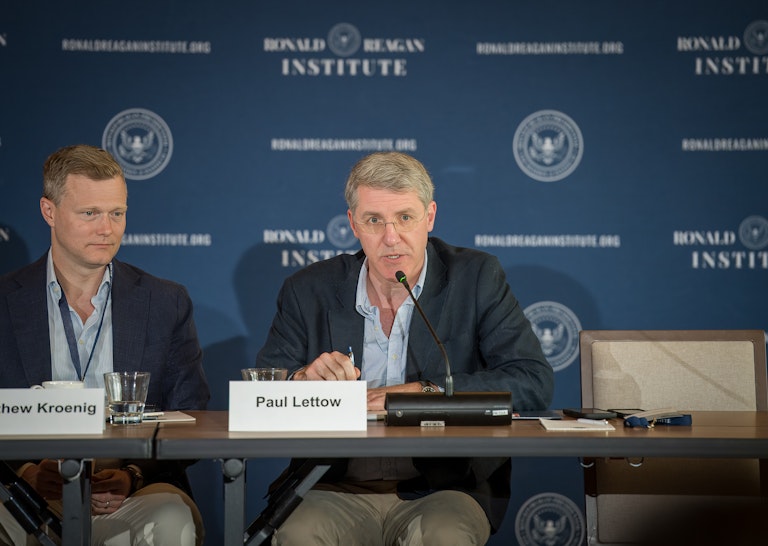Ronald Reagan Institute
The GOP’s Foreign Policy Arc: Future History
By Paul Lettow

I have had occasion, over the last couple of years, to study and give some thought to U.S. national security strategy from Truman to today, in preparation for writing my book on that subject. At times I have marveled at the foresight and dedication to the well-being of future generations shown by some of our leaders. On other occasions I have been dismayed and saddened by policymakers’ self-delusion, willful blindness, or unwillingness to heed any but the most short-term of considerations. All of it had consequences, good or bad.
What I will do now is unorthodox for a discussion of history, statecraft, and policy. I want to pull us forward into the future. I will ask, and try to answer as best I can, what future historians will make of us.
Four points:[i]
1) The People’s Republic of China. After the United States and the People’s Republic of China (PRC) had shared a limited interest in maneuvering to counter their mutual geopolitical rival the Soviet Union, the United States purposefully sought to increase the comprehensive economic power, and thus military power, of the PRC; to expand its regional and global stature, influence, and role absolutely and relatively; and to facilitate its overall rise to superpower. The United States persisted in that course for decades. The PRC is and always has been an ethno-nationalist, Leninist, totalitarian party state dedicated to extending its hegemony wherever and whenever possible. The Chinese Communist Party perceives its long-term interests as antithetical to ours.[ii] The monster that resulted from the PRC’s rise to superpower status, which we fostered, is now unsurprisingly trying to dominate and, if possible, destroy us. I am aware of no precedent or analogy in history of a strategic error of this kind.
Future historians will be astonished at how and why this occurred: “How could they have done that?” There is plenty of blame to go around, including toward conservative internationalists, some of whom went along with it, and others of whom did not raise the alarm nearly as straightforwardly and effectively as we could and should have. Now policymakers are starting to catch up to where the American people have long been and are trying to stop and counteract this strategic disaster.
Many of the policymakers in the two Trump administrations have been animated by and dedicated to a long-term and peaceful but vigorous and comprehensive competition with the PRC. Also, one suspects that if the U.S. private sector were told clearly the direction of U.S. policy, the intent to see it through together, and that it is time to stop relying on and enriching the PRC, they would say, “Ok, fine, we’ll make the necessary changes.” And it seems clear, both from history and common sense, that if we are to prevail in such a competition, it will be in part by leveraging the extraordinary comparative advantage of our alliance and partnership networks. That would require focusing on and explaining all of this to our allies and rallying them, which would in turn necessitate not going out of our way to antagonize them.
But one has reason to be skeptical that is what President Trump wants to do. And one has reason to suspect that future historians will conclude of this era, “Most of all, he just wanted a deal.”
2) Nuclear nonproliferation, and Iran. Once a country has a sufficiently large enrichment (or reprocessing) program, it is a proto-nuclear weapon state. Enrichment and reprocessing can produce fuel for nuclear reactors or the fissile material for a nuclear weapon; the production of fissile material is the most difficult aspect of making a nuclear weapon; and enrichment and reprocessing are difficult to detect, and thus are conducive to clandestine programs. Enrichment and reprocessing are not specifically permitted or guaranteed under the Nuclear Nonproliferation Treaty.[iii]
North Korea established clandestine enrichment and reprocessing, we entered into negotiations with it that provided it benefits, North Korea expanded the programs without effective cost, consequence, or limitation, and then it became a nuclear-weapon state, despite having been party to the Nuclear Nonproliferation Treaty (it has since left). Our approach to North Korea was a mug’s game, an abject strategic failure.
Until this summer, we had been headed down the same path with Iran, thus violating one of my father-in-law’s cardinal principles of life and national security strategy: “A dolphin would have learned the first time.” But then Israel hammered Iran’s proxies, and then it hammered Iran itself, which brought about the U.S. military strikes on Iran’s nuclear program.
The current regime in Iran hates the West generally and America specifically, and it will seek a nuclear weapon, or at least to become a proto-nuclear weapon state. It’s in their DNA, who they are. And a nuclear or proto-nuclear armed Iran would have all manner of negative effects on U.S. interests in the Middle East and beyond.
Yet no one wants further armed conflict with Iran, either. There is only one plausible alternative on the spectrum between acquiescence and war, and that is to turn the screws on the Iranian regime as much as possible, intensifying strains on the regime and trying to force it to see meeting our interests as its best possible option.
Future historians will wonder at how Democratic presidents (Clinton, Obama, Biden) kept trying to pursue détente with the mullahs while the mullahs kept reciprocating by hitting us in the head with a 2x4. And future historians will also reflect on the tragedy of those Democratic presidents being in office at the precise moments when the Iranian regime was most vulnerable and shaky (e.g., 1999, 2009). The Iranian regime, with its proxies battered and with Iran itself having taken blows from Israel and the United States, is currently on the back foot. Let us be like the dolphin, and learn. Tighten the screws.
3) Ukraine. After three years of all-out fighting and one million Russian casualties, Russia controls not 100% of Ukraine’s territory, but around 20%. Russia’s war has resulted in: 1) a significant expansion in defense spending and increased commitment by virtually all members of the NATO alliance, as well as 2) Finland and Sweden joining NATO. Ukraine has been supplied and supported by us and others, yes. But Ukrainians have been doing the fighting. And in that they have exceeded all reasonable expectations.
Given all of that, if U.S. actions at this stage—e.g., cutting off aid, forcing a bad peace deal, selling Ukraine out as part of some larger effort at détente with Vladimir Putin that will, inevitably, end badly—caused Ukraine to lose the war, it would be the most extraordinary development for future historians to try to understand. It would also be political suicide in America for anyone associated with it.
4) America’s Future. Spending on entitlement programs as currently structured, and interest on the federal debt, are dragging America down and imperiling our future. And until we deal with it, the alacrity and consequence of the catastrophe that looms will increase. Moreover, everyone in DC knows this.
If we are unable to carry our burden on defense or foreign policy, it will not be because of X number of U.S. forces in Germany or Korea, or because we must only focus on the Taiwan Strait to the exclusion of anything else, or because of David Attenborough shows on PBS.
It will be because we saw this crisis coming for decades, and with few exceptions in public life (e.g., Paul Ryan) we just accepted that, or saw fixing it as less important than the perceived political costs of taking any of the relatively simple and painless steps to avoid it. That is the very opposite of strategy—and of statesmanship.
So the most fundamental message of future historians might be: “They did it to themselves.”
[i] I could include more, but as Georges Clemenceau said of Woodrow Wilson’s Fourteen Points: “God Himself had only ten.”
[ii] To those currently thinking to themselves, “Well, no, at time X the decisionmakers of the CCP comprised decent and well-meaning chaps who meant to be friends of the United States and shared our interests, and to the extent that is not so just at the moment, it is the fault of Xi Jinping,” you are wrong, and that thinking is part of how we got into this mess.
[iii] Paul Lettow, “Strengthening the Nuclear Nonproliferation Regime,” Council on Foreign Relations, April 2010, https://www.cfr.org/report/strengthening-nuclear-nonproliferation-regime
Join Our Newsletter
Never miss an update.
Get the latest news, events, publications, and more from the Reagan Institute delivered right to your inbox.
